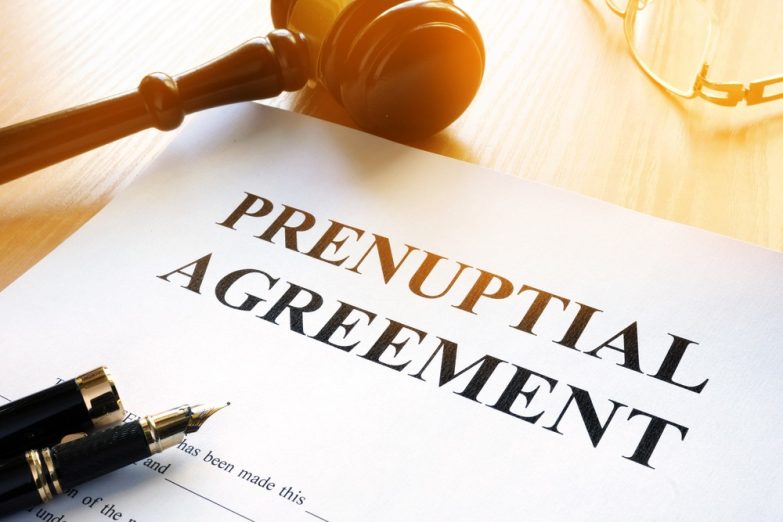It is common for engaged couples to avoid discussing their current and future finances. It is also common for soon-to-be-married couples to avoid discussions about potential marital problems. Conversations regarding issues that may arise during the marriage are uncomfortable but they are important. Talking with your spouse about a prenuptial agreement may help effectively communicate individual financial objectives, spending habits and debts.
There are many negative and incorrect preconceived notions regarding prenuptial agreements. Below are some common questions and helpful answers for engaged parties to read through together to help make an informed decision about a possible prenup.
Frequently Asked Questions About Prenups
What Is a Prenuptial Agreement?

A prenuptial agreement, also called an antenuptial agreement, is a contract that two people who are getting married sign prior to the wedding. In every state, married people have certain rights concerning property, support, and inheritance in the event of the death of their spouse or in the event of divorce.
Prenuptial agreements are meant to override the rights that spouses would otherwise have in the assets and income of the other spouse. Additionally, prenuptial agreements play a crucial role in many other issues, including the award of attorney’s fees in the event of a divorce and the award of the “spouse’s share” in the event of the death of the other spouse.
In short, “what is a prenup” is quite simple. It is a legal contract where engaged couples define their rights and responsibilities for marital and premarital assets and debts if a divorce or death should occur.
Why Do People Want Prenuptial Agreements?
People who are getting married may want a prenuptial agreement to protect assets they acquired or inherited before and after the marriage. Their goal with pursuing a prenuptial agreement may be to preserve what they earned during the marriage so their earnings do not become part of the “marital estate.”
Sometimes both parties to the prenuptial agreement have been widowed, and they want to be sure their estate goes to their children from their first marriage instead of their current spouse if they die or become divorced.
When Are Prenuptial Agreements Valid?
The validity of a prenuptial agreement may vary from state to state. Most state statutes lay out specific requirements for a prenuptial agreement to be valid, these statutes may include:
- Full disclosure of all income and assets
- Notice to both parties of the ability to obtain counsel
A prenuptial agreement is not always valid even though it satisfies the state statutory requirements. The validity of a prenuptial agreement requires an in depth analysis of the state statutes and case law on the issue. Contact an experienced family law attorney to determine the validity of a prenuptial agreement.
When Are Prenuptial Agreements Not Valid?
Prenuptial agreements are not valid if they do not follow the requirements laid out via statute and case law. In Minnesota, among other things, the Courts will examine the facts of a specific situation to ensure the prenuptial agreement is fair at the time of divorce.
An example would be if there were a provision in the prenuptial agreement that a spouse agreed to never seek spousal maintenance. However, that spouse became totally disabled during the marriage and would be impoverished in a divorce without spousal maintenance. In such rare circumstances, the agreements, or parts of them, have been set aside by the Courts.
Can You Get a Prenup After Marriage?
While prenuptial agreements occur before the marital union, postnuptial agreements, or postnup, can be acquired during the marriage. A postnuptial agreement also has specific requirements under state law, so be sure to contact an experienced family law attorney if you are considering entering into or challenging a postnup agreement.
How Do I Decide Whether I Need a Prenuptial Agreement?
Because these agreements change basic rights for individuals entering into a marriage contract, it’s crucial that an experienced prenuptial agreement attorney represents each party. Deciding whether or not one should seek a prenuptial agreement is entirely dependent on their own financial circumstances, assets, family status, children, inheritance and debts.
An attorney can help explain basic rights, advise client decision-making, and outline the rights in the agreement if a divorce or death should occur. If one soon-to-be spouse is considering a prenuptial agreement, it’s recommended that the other speak to a skilled prenup attorney to understand what he or she may be giving up.

Who Should Get a Prenup?
There are many circumstances where a prenup may be beneficial. These include, but are not limited to:
- One or both parties has previously been married and may not be willing to marry again without a firm grasp on their financial future. These couples have gone through the divorce process and have experienced difficulties in marital assets, debts, inheritances, and more. Additionally, a previous divorce may affect a party’s future financial obligations.
- There are children involved in the marriage. It’s not uncommon for one or both parties to require protection regarding the financial interests of children from a previous marriage. A prenuptial agreement can be a sound prevention method for potential financial conflicts in regards to a will if a parent dies.
- One spouse has significantly more wealth and wants to protect their assets in the unfortunate case of marriage dissolution. When most people think about prenuptial agreements, this is the scenario that comes to mind. However, a prenup can benefit both parties by allowing for quicker resolution of a divorce and financial certainty.
- One party has acquired more debt, for example, credit card debt. Premarital debts are typically paid by the individual who incurred them. However, debts acquired during the marriage are often allocated to both parties, which may put one spouse at a significant disadvantage in the case of a divorce or death.
- If a spouse owns a business, a prenuptial agreement can protect shares in the company if a divorce were to occur. A prenup can provide full discretion to a party over the present and future management of the business. Additionally, a business may increase in value during the marital union and one spouse may want a share of that increase. A prenup can outline the rights each party may have to the business and profits in the event of a divorce.
There are many types of soon-to-be-married couples that should seriously consider prenuptial agreements. While many people only think of prenups as a way to protect assets when one spouse is significantly wealthier than the other, countless marriages could benefit from prenuptial agreements. In addition to the examples above, individuals may also consider this marital contract if:
- One party will be a stay-at-home parent.
- One or both parties want to protect their inheritance.
- Either party wants to keep their personal life and finances private.
Are You Considering a Prenup?
If you’re up in the air about whether or not you should get a prenup, consider speaking to a dedicated prenuptial agreement lawyer. After an engagement, many couples are starry-eyed and do not think about the potential financial fallouts of marriage dissolution.
Regardless of your financial status, a prenuptial agreement can protect your financials and assets in the case of an unexpected death or divorce. We offer attorneys with over four decades of exclusive family law experience to help clients make informed decisions and protect their basic rights before marriage.
This article contains general legal information and does not provide legal advice. For legal advice, please contact M. Sue Wilson Law Offices today.

